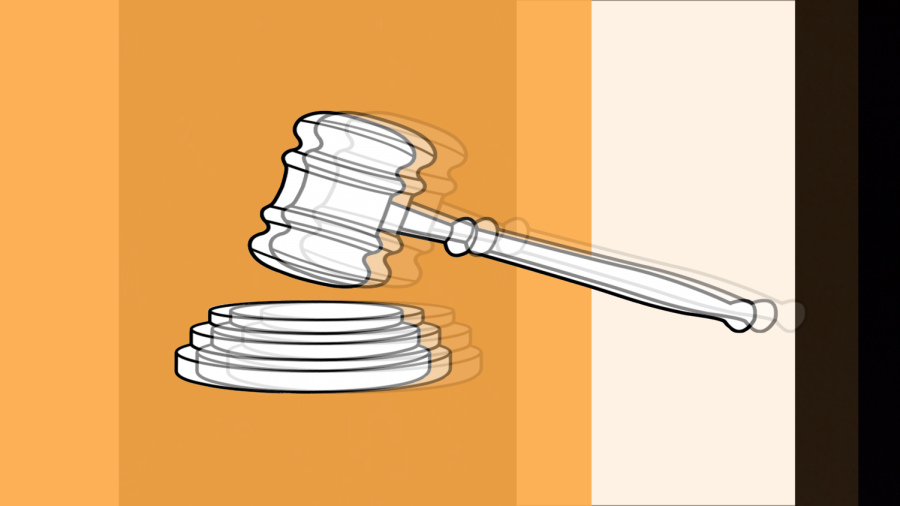Cushman: End the Death Penalty in Utah for a Fairer Justice System
(Graphic by Emily Christensen | The Daily Utah Chronicle)
January 26, 2022
In 2015, Utah aimed to drastically change criminal justice with House Bill 348. The legislation intended to reduce recidivism and the cost of crime by moving nonviolent offenders away from prisons and toward community supervision. Parts of the law haven’t been implemented and its success is up for debate. However, H.B. 348 showed Utah changing its approach to crime and thinking about what justice means to our state.
Now, two Republican legislators are leading the charge to end the death penalty in Utah. H.B. 147 would remove capital punishment as a sentence for aggravated murder, essentially ending the practice in our state for any new convictions. Like the reforms seven years ago, H.B. 147 asks Utahns to reevaluate what justice should look like. Utah needs to pass H.B. 147 to create better outcomes and shape a brighter future for justice in our state.
Although over 4% of today’s inmates awaiting execution are innocent, H.B. 147 was not written to protect potentially innocent offenders. Similar to H.B. 348 in 2015, cost motivates conservatives pushing an end to the death penalty in Utah. Research shows that death penalty cases cost far more than life sentence cases. A 2012 study showed that Utah spent about $1.6 million more per death sentence case than life sentence case. In 2018, researchers found over the previous 20 years, only two of 160 cases resulted in a death sentence, even though Utah spent $40 million pursuing the death penalty in those cases.
This high cost becomes harder to justify after the last two inmates to leave death row did so through natural death rather than execution. Although Utah uses the death penalty sparingly, executing only seven prisoners since 1978, it creates higher costs for punishments that are, effectively, life sentences.
However, Utah’s need to end the death penalty, despite its infrequent use, extends beyond fiscal cost. At age 15, Sharon Weeks found out that her sister and baby niece had been murdered. One of the men responsible, Ron Lafferty, was sentenced to death on or around July 19, 1996. But that day came and went with no execution. For Weeks, each development of the high profile case retraumatized her as the media would once again write pieces discussing the gruesome murders of her family members and the men who killed them. She described her family’s experience waiting for the execution through postponement after postponement to Deseret News as being “shackled” to her sister’s killer and a “personal hell.”
Despite originally wanting Ron Lafferty’s execution, Weeks now advocates against the death penalty and even worked with the legislators in charge of H.B. 147. The experience of this family shows that the effects of a crime don’t end with a guilty verdict or harsh sentence. That short-lived victory matters, but it doesn’t necessarily protect or facilitate healing for victims. Our legislature needs to pass H.B. 147 to ensure faster justice and better protection for the wellbeing of victims and families affected by crime.
H.B. 348, although not fully achieved even seven years later, attempted to provide better outcomes for offenders in our criminal justice system. This session’s H.B. 147 has goals to do the same for victims and families affected by crime. Collectively, these pieces of legislation teach us that the harshest sentence is not only expensive, but that its aftermath can prove more damaging to both offenders and victims.
These bills ask us to reexamine the way our justice system works now. The Weeks family’s experience shows that a punishment-focused criminal justice system, while theoretically designed for victims of crime to get justice, can ultimately create worse outcomes for them. An outcome-focused approach, rather than a punitive one, will allow Utah to create a justice system that works better for offenders and victims. H.B. 147 achieves this by removing the possibility of sentencing innocent people with the death penalty and making justice swifter for victims.
In a state that preaches loving our neighbors, it’s well past time to start listening to their experiences. In doing so, we can work to make a justice system that better serves all of us, rather than deciding what justice means without consulting the people who have worked through the criminal justice system. This session, we need to tell our representatives that we’ve listened and learned, and that they must pass bills like H.B. 147. While this bill isn’t an end-all to criminal justice reform, it can act as a beginning to rethinking what criminal justice means to Utahns.














Dudley Sharp • Jan 27, 2022 at 7:15 am
KC:
1) The 4% innocent
The study was absurd, did you fact check it?
The Death Row “Exonerated”/”Innocent” Frauds
71-83% Error Rate in Death Row “Innocent” Claims, Well Known Since 2000
at prodpinnc
2) Utah has, never, done a thorough costs study of the death penalty vs equivalent LWOP cases,
— from pre trial, trial, appeals, incarceration and medical/geriatric care,
— inclusive of the huge cost credit to the death penalty, for providing the only avenue for a plea bargain to LWOP
— Note that responsible appeals should take no longer than 7 years, on average, as Virginia did, with 113 executions, since 1976, with no innocent executed.
— If you cared about the trauma of victims’ survivors, within appeals, you may wonder why Utah is so irresponsible.
— It’s not the “death penalty’s fault, but management. Obvious.
— 90-95% of the loved ones of those murdered in a capital murder case support executions.
Do you care?
— Check out “loving our neighbors”
The Death Penalty: Mercy, Expiation, Redemption & Salvation
at prodpinnc
Jesus and the Death Penalty
at prodpinnc
dudleysharp • Oct 17, 2022 at 2:19 pm
KC
Did you review?
dudleysharp • Oct 29, 2023 at 8:17 pm
anything?